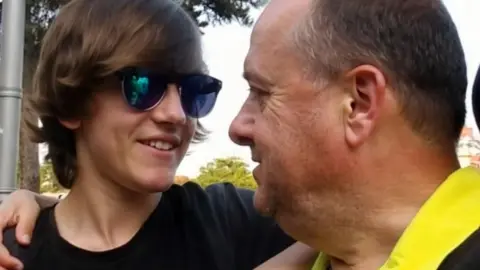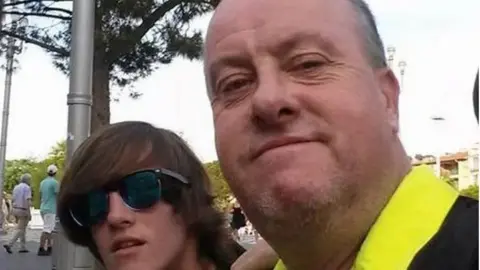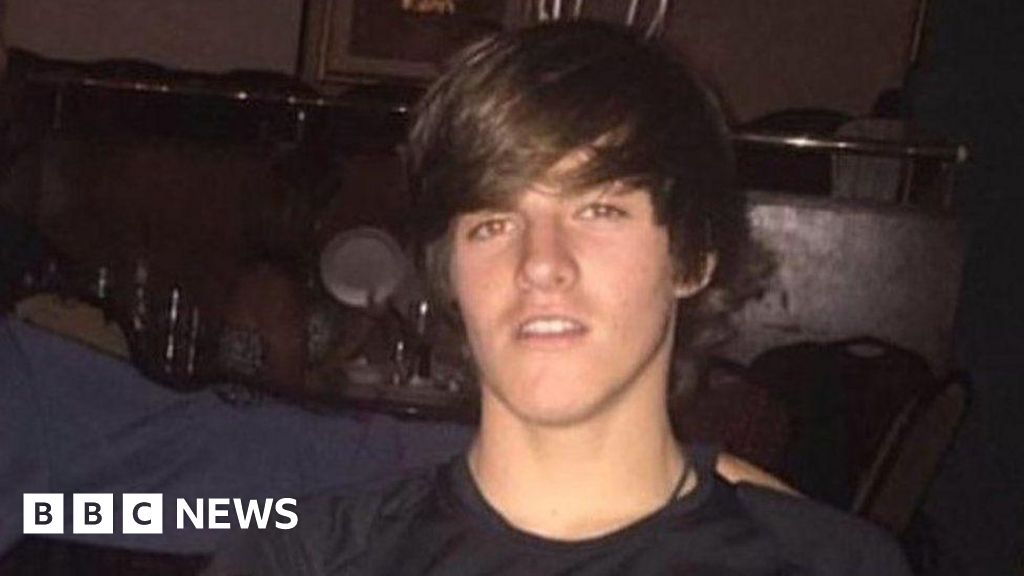BBC News, Liverpool
 Michael Rainsford
Michael RainsfordA Merseyside criminal who shot dead a 20-year-old man in a case of mistaken identity should have been arrested months before the murder, the police watchdog has said.
Mikey Rainsford was killed in his family home in Litherland after gang member James Foy opened fire through a window on 7 April 2020, in search of revenge against a rival group.
The Independent Office for Police Conduct has upheld a complaint from Mr Rainsford’s father Michael, who argued Foy should have been arrested by police previously after his DNA was found on a handgun.
A Merseyside Police spokesman said the force was considering its response but repeated that it did not possess sufficient evidence to arrest Foy before the murder.
The force knew a DNA profile matching Foy had been found on the magazine of a handgun seized during in a raid at a property in Bootle in November 2019.
But detectives did not arrest Foy or seek charging advice from the Crown Prosecution Service until after Mr Rainsford’s murder.
The IOPC has now concluded there had been “no reason to justify” delaying then 18-year-old Foy’s arrest.
A case reviewer wrote that the decision “then allowed for a series of events that has resulted in the death of the complainant’s son”.
One detective sergeant had a case to answer for misconduct, the watchdog said, but it recommended the officer be dealt with through a “reflective practice review process” rather than face a disciplinary hearing that could result in dismissal.
The case reviewer said in a letter to Mr Foy, seen by the BBC, that: “Whilst it is my view that [the detective sergeant] could not have reasonably foreseen the murder occurring, it does not diminish the harm that this has caused to the complainant and his family.”
 Merseyside Police
Merseyside PoliceFoy was in fact convicted of possession of the firearm found in November by a jury at the same time he was convicted of the killing.
The IOPC concluded that no new evidence had been found after the murder that had not already been available for months.
Merseyside Police had told Mr Rainsford Snr and the IOPC that one reason they had not arrested Foy before April 2020 was because his DNA was on a removable part of the gun, which they argued could present difficulties in proving the possession charge.
However, the IOPC case reviewer said: “It is my view that the presence of Mr Foy’s DNA located on the magazine of a firearm would have been sufficient to provide reasonable grounds to suspect him of having had possession of the gun at the time.”
CPS lawyers had also said the location of the DNA was sufficient evidence to charge Foy.
Mr Rainsford’s father told the BBC the IOPC’s findings were “still sinking in”.
He said: “It’s been my campaign since two weeks after Michael was murdered, when I didn’t get the very first answer to the first question to Merseyside Police, it’s been a mission to get justice for Michael.
“What happens next I don’t know. Ultimately, what I want is accountability and transparency so no other family has to go through this.”
 Michael Rainsford
Michael RainsfordThe victim was in the kitchen of his family home in Harrington Road, Litherland, gathering snacks to take to his girlfriend’s house when two bullets were shot through a window at 23:10 BST.
Mr Rainsford collapsed in the hallway as his family desperately called 999.
It later emerged Foy and his brother Michael Foy had been seeking revenge after someone smashed a window at their family home in Rossini Street, Seaforth.
The two men were both connected to a local gang known as the Linacre Young Guns, and believed members of rivals the Kirkstone Riot Squad were responsible.
Detectives concluded Mr Rainsford, a college student with a passion for skateboarding and photography, had no links to any gangs and was not involved in organised crime in any form.
It is believed the Foy brothers targeted the address as it was in an area considered the territory of the rival gang.
Both brothers denied being involved but were convicted of murder and jailed. After his conviction, James Foy’s barrister announced in court that his client wanted it to be known he was in fact the gunman.
Mr Rainsford previously said: “You just can’t move on and you try your best. You do limp on but life is never, ever the same.”
 Michael Rainsford
Michael RainsfordAfter the shooting, when police confirmed Foy was being held on suspicion of more than one set of offences, Mr Rainsford began to question why the earlier firearms charge had not been progressed sooner.
A formal complaint followed, and Merseyside Police conducted its own internal investigation, which found there was not enough evidence to arrest Foy before the murder.
However, Mr Rainsford appealed to the IOPC, which asked the force to reinvestigate elements of its response to the grieving father.
This week the watchdog contacted Mr Rainsford to confirm it agreed with what he had been claiming for five years.
Mr Rainsford said: “I’m very pleased that I’m right and I have always been right, it’s very difficult to find the answers when one party holds all the cards.”

